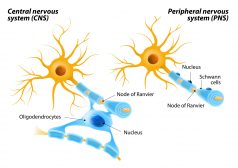Definition
noun, plural: efferent nerves
The type of nerve that carries nerve impulses away from the central nervous system to the periphery
Supplement
In the peripheral nervous system of vertebrates, there are two main types of nerves: (1) efferent nerves and (2) afferent nerves. The efferent nerves are nerves that carry nerve impulses away from the central nervous system. They carry the impulses to muscles and organs. Motor nerves, which are made up of a chain of motor neurons, are efferent nerves. They originate in the spinal cord and innervate muscles. They receive impulses from the central nervous system and produce the appropriate response through the effector. Effectors are target muscles and glands that produce a physiological response when the activation of the efferent nerve with a nerve impulse results in the release of neurotransmitters. Disease or damage in the motor nerves would affect muscle movements, e.g. speaking, walking, running, breathing, and so on. For instance, amyotrophic lateral sclerosis, a disease caused by the death of upper and lower motor neurons, results in muscle wasting and difficulty in speech, breathing and swallowing.
Word origin: Latin efferēns, efferō (bring or carry out), from ē (out of), short form of ex, + ferō (carry) + Latin nervus (sinew)
Synonym(s):
- centrifugal nerve
Compare:
See also:
- nerve
- somatic nervous system
- motor nerve





